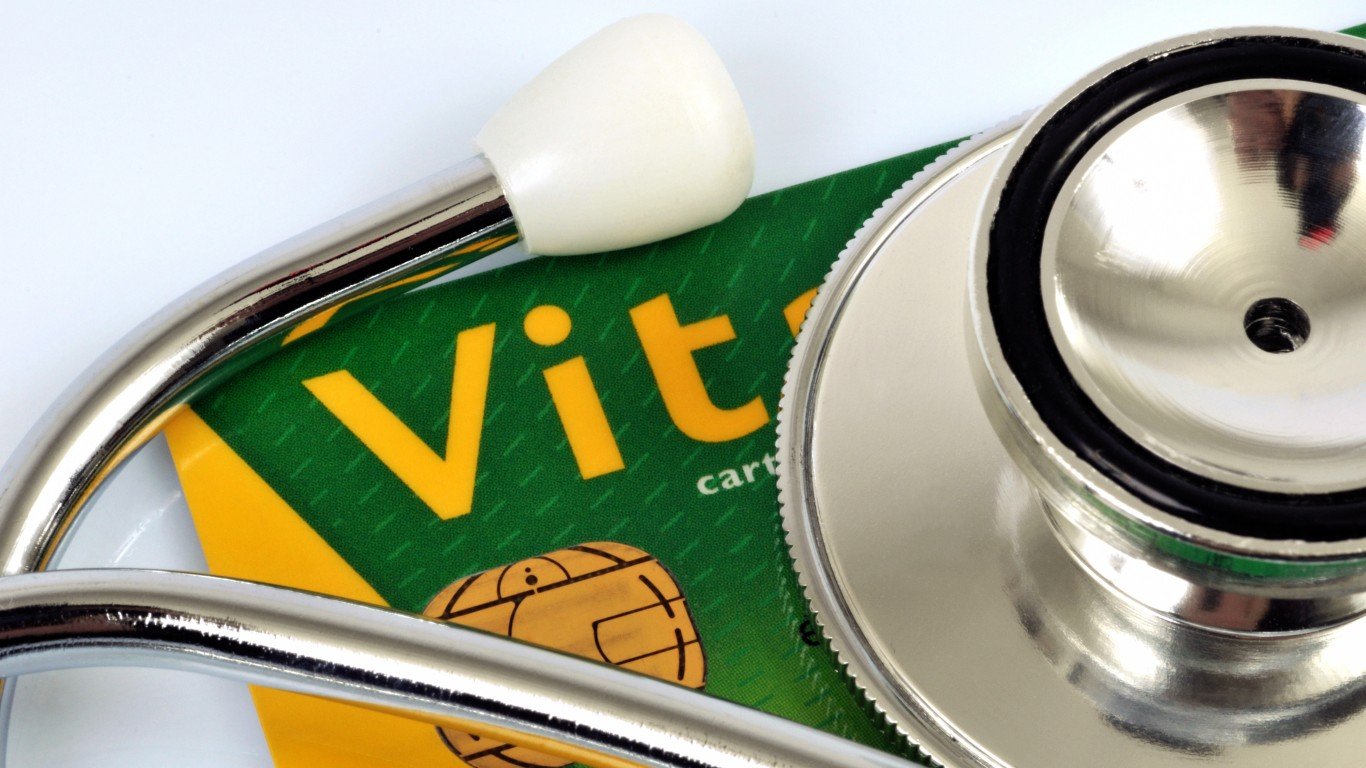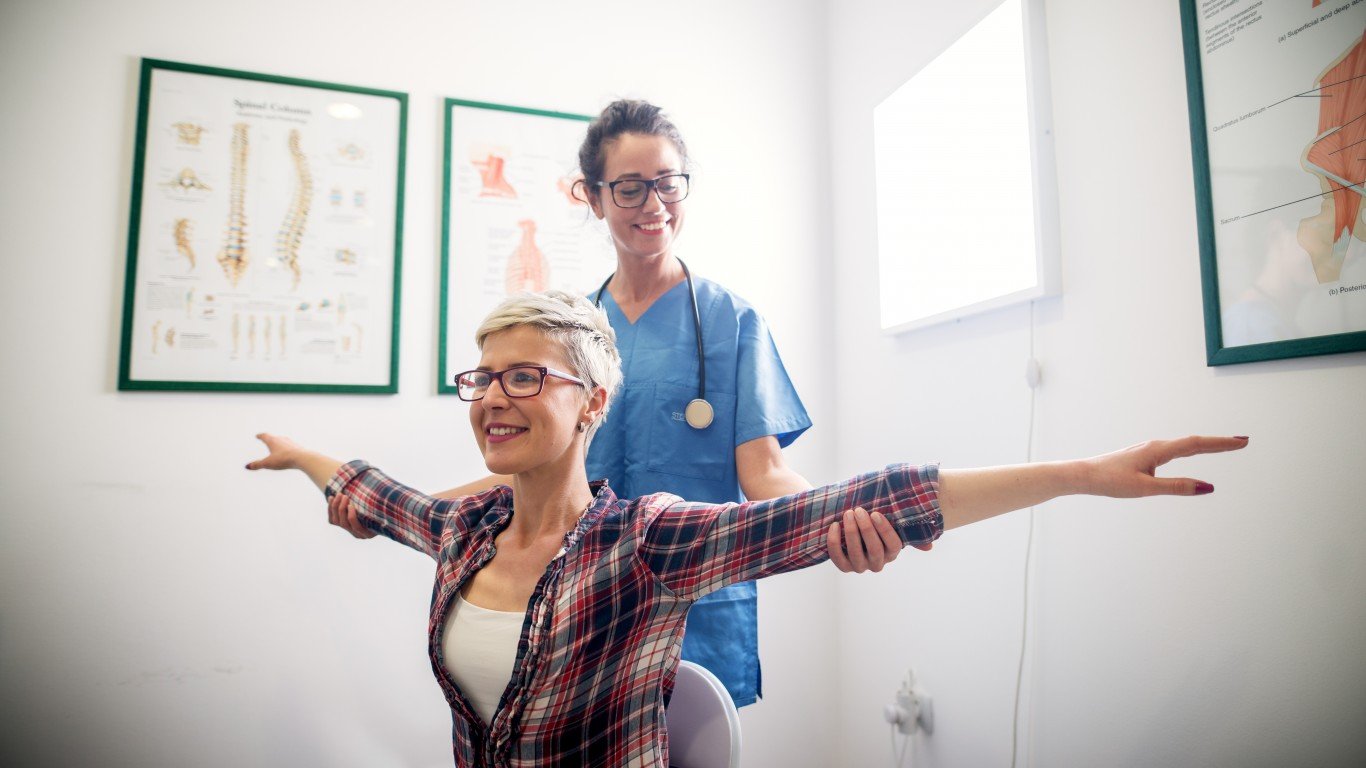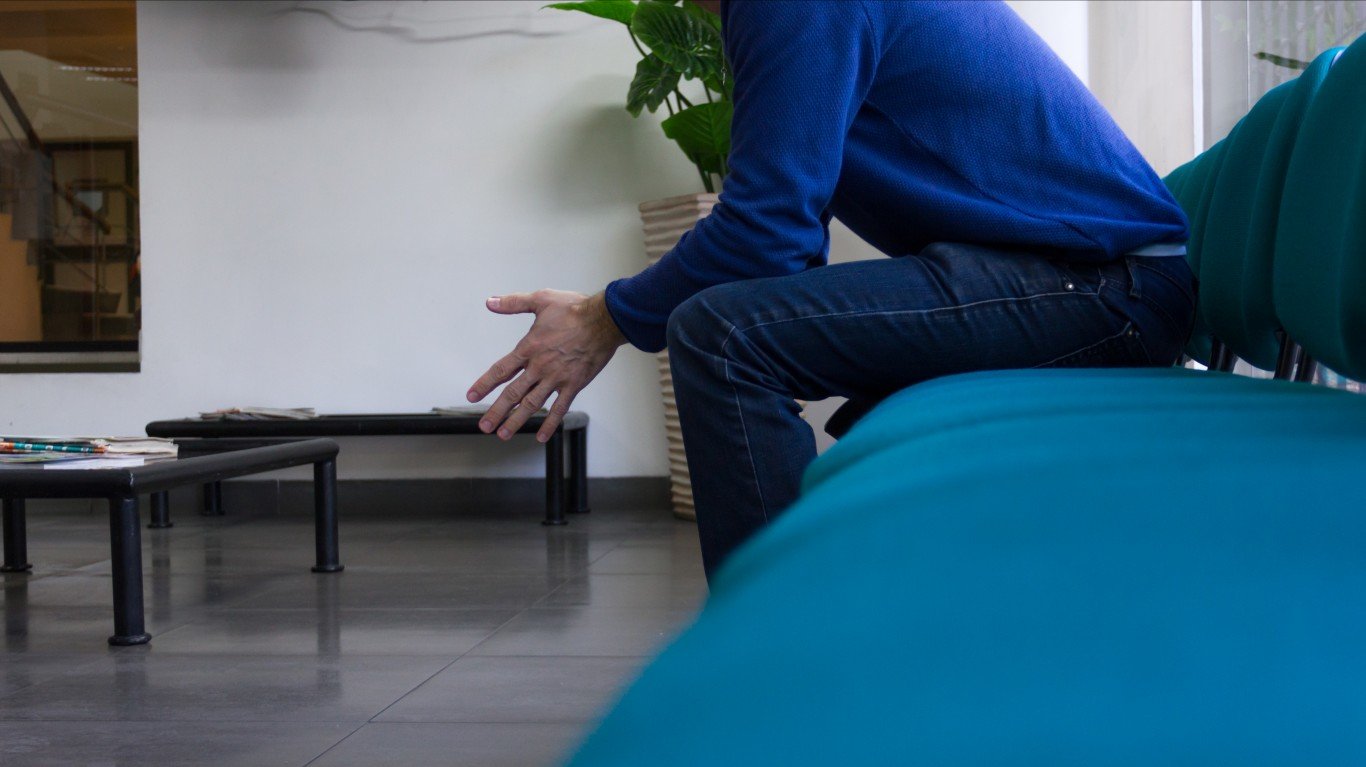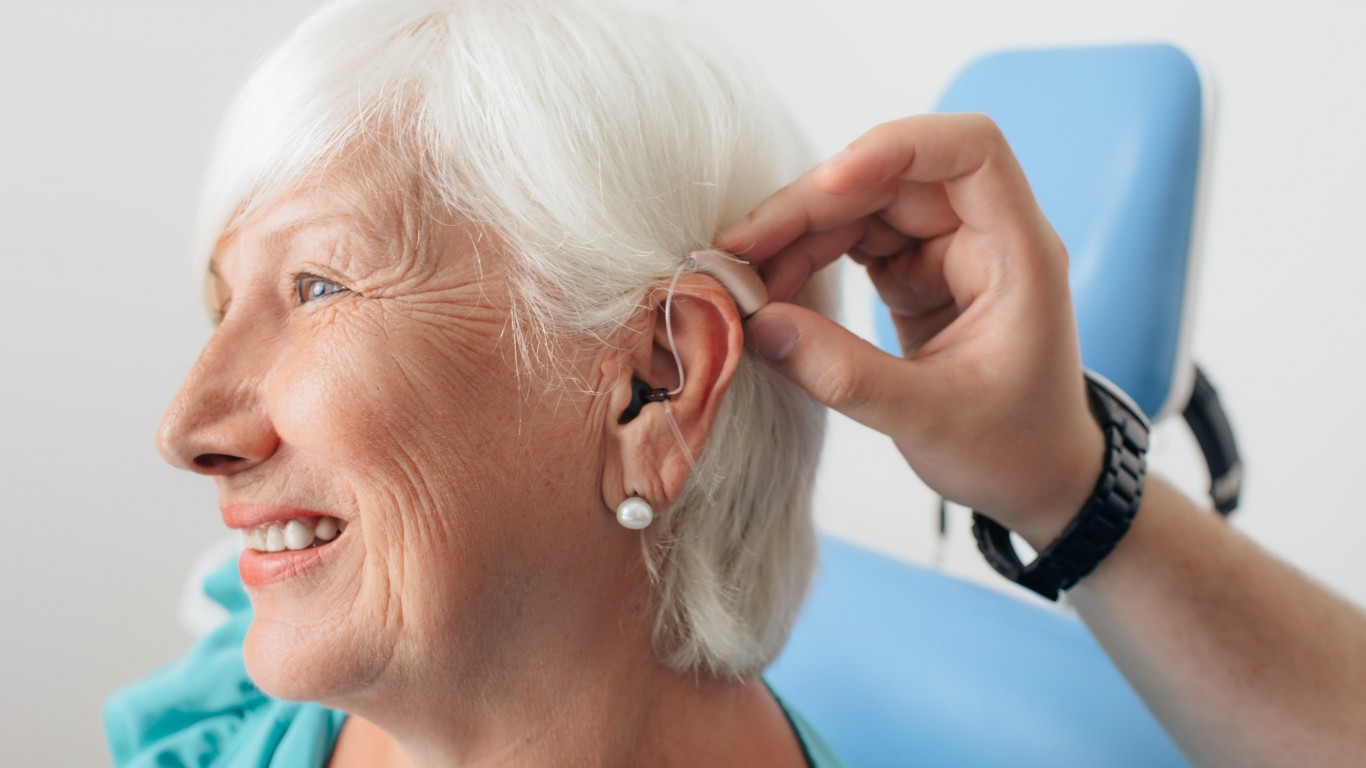

The coronavirus pandemic has thrust the shortcomings of America’s health care system into the spotlight once again. The United States has one of the costliest health care systems in the world, and it is home to an estimated 27.5 million people who do not have health insurance. Even for those Americans with coverage, the out-of-pocket cost of treating the virus could exceed $1,300, according to a Kaiser Family Foundation study.
Average out-of-pocket medical expenses can be a telling measure of the efficacy of a health care system. According to the Organization for Economic Cooperation and Development, an international organization of 36 member states working toward improved global prosperity, higher out-of-pocket costs have been shown to translate to worse health outcomes. Out-of-pocket costs cover everything paid for directly by the individual, including prescription drug and doctor’s visit copays as well as health insurance deductibles and medical goods for personal use.
Using health spending data from the OECD, 24/7 Wall St. reviewed per capita out-of-pocket health care spending in the 20 most populous OECD member states to determine how Americans’ medical bills compare to other countries.
High out-of-pocket medical costs can deter someone with a medical problem from seeking treatment. This may partially explain why countries with high average out-of-pocket costs also often have worse outcomes. In the United States, for instance, the country with the highest out-of-pocket spending on this list, average life expectancy at birth is 78.6 years, lower than in the vast majority of countries on this list. Here is a look at the countries where people live the longest.
Medical care costs shouldered by patients in the U.S. are representative of the high overall costs across the health care system. When considering all forms of medical spending, including government and private industry, the U.S. spends far more per capita than every other OECD nation. This is due in large part to higher prescription drug and administrative costs. Here is a look at the countries spending the most on public health.
Click here to see how Americans’ medical bills compare to other countries
Click here to read our methodology

20. Turkey
> Per capita out-of-pocket medical spending: $206 a year (17.4% of total)
> Total per capita health care spending: $1,227 a year
> Life expectancy at birth: 78.1 years
> Population: 82.3 million
Turkey spends $1,227 per person on health care annually, less than every other country in OECD except for Mexico. This figure includes everything from personal care such as curative and ancillary care as well as collective services such as prevention, public health services, and administration. The vast majority of health care spending in Turkey (78.0%) is shouldered by the government. Out-of-pocket costs in the country amount to just $206 per capita, the least of any OECD country.
[in-text-ad]

19. Czech Republic
> Per capita out-of-pocket medical spending: $422 a year (14.8% of total)
> Total per capita health care spending: $3,058 a year
> Life expectancy at birth: 79.1 years
> Population: 10.6 million
Per capita out-of-pocket expenses for the Czech population amount to about $422 a year, less than in nearly every other OECD country. Of the $3,058 annual per capita health care spending in the Czech Republic, 82.6% is government spending on channels like health administration and public insurance plans.
Though health care spending in the Czech Republic — both out-of-pocket and overall — is well below the comparable per capita spending in the United States, outcomes are slightly better. The average life expectancy at birth in the Czech Republic is 79.1 years, about six months longer than it is in the United States.

18. Poland
> Per capita out-of-pocket medical spending: $423 a year (20.6% of total)
> Total per capita health care spending: $2,056 a year
> Life expectancy at birth: 77.9 years
> Population: 38.0 million
Poland is in the midst of reforming its health care system, which has faced problems due to underfunding. In 2015, the ruling party suspended the commercialization of public hospitals and introduced a series of reforms that would grant all Polish citizens access to free health care, funded by income tax revenue. The country’s spending boost is projected to increase investment in public health care from its current level of just under 5% of GDP to 6% by 2025. Currently, about one in every five dollars spent on health care in Poland are out-of-pocket patient expenses.

17. Mexico
> Per capita out-of-pocket medical spending: $456 a year (41.3% of total)
> Total per capita health care spending: $1,138 a year
> Life expectancy at birth: 75.0 years
> Population: 126.2 million
The Mexican government spends less on health care per capita than every other OECD country. Government health care spending amounts to only $586 per person in Mexico, well below the per capita health spending in Turkey of $957, the next lowest spending OECD country. Meanwhile the U.S. government spends nearly $9,000 per capita on health care annually.
Out-of-pocket health care spending in Mexico is also low. Mexican citizens pay on average just over $450 per year on health care, less than in all but a handful of other OECD countries.
[in-text-ad-2]

16. France
> Per capita out-of-pocket medical spending: $463 a year (9.4% of total)
> Total per capita health care spending: $4,965 a year
> Life expectancy at birth: 82.6 years
> Population: 67.0 million
French spend an average of $463 on health care, including on personal care items and medical goods. Like most OECD countries, France has a publicly-financed health insurance system that provides universal coverage. The French system is funded primarily by employer and employee payroll taxes and income tax. Undocumented immigrants who have applied for residence are covered, and visitors from outside the Eurpoean Union are covered for emergency services.
France has some of the best health outcomes of any country in the world. Life expectancy at birth in the country is 82.6 years, four years longer than the United States’.

15. Netherlands
> Per capita out-of-pocket medical spending: $570 a year (10.8% of total)
> Total per capita health care spending: $5,288 a year
> Life expectancy at birth: 81.8 years
> Population: 17.2 million
The Dutch have a universal health care system that covers an estimated 99.8% of the population. Still, residents must pay out-of-pocket costs related to hospital admissions and prescription drugs. This cost, in addition to personal spending on medical goods, comes out to $570 per resident a year, or about 10.8% of total medical spending.
As is typically the case in OECD countries with universal health care, the Netherlands has a relatively healthy population. Life expectancy at birth in the country is 81.8 years, well above the global average of 72.4 years.
[in-text-ad]

14. Japan
> Per capita out-of-pocket medical spending: $608 a year (12.7% of total)
> Total per capita health care spending: $4,766 a year
> Life expectancy at birth: 84.2 years
> Population: 126.5 million
Through a network of over 3,400 insurers, Japan has a universal health care system that is required by law to provide high quality care to all citizens. Funded primarily by taxes and employee and employer premiums, the system derives only about 12% of its funding from out-of-pocket patient costs. The typical Japanese citizen pays $608 out of pocket in medical expenses every year.
Japan’s health care system appears to be functioning better than most, as life expectancy at birth in the country is 84.2 years, nearly the highest in the world.

13. United Kingdom
> Per capita out-of-pocket medical spending: $629 a year (16.0% of total)
> Total per capita health care spending: $4,070 a year
> Life expectancy at birth: 81.3 years
> Population: 66.5 million
In the U.K., the National Health Service, or NHS, provides health care to most residents. Though coverage is universal, about one in every 10 British nationals are enrolled in some form of private insurance program, which typically offers faster and more convenient access to health care.
In addition to medical products for personal use, British residents can still have out-of-pocket costs for outpatient prescription medication and dental services. At $629 per year, the per capita out-of-pocket medical spending in the U.K. accounts for about 16% of all health care expenditure.

12. Germany
> Per capita out-of-pocket medical spending: $738 a year (12.3% of total)
> Total per capita health care spending: $5,986 a year
> Life expectancy at birth: 81.1 years
> Population: 82.9 million
The vast majority of German residents receive their health care through publicly funded insurance programs, and about one in every 10 Germans opt for private health insurance. The public option is funded largely through taxes on businesses and workers, while private insurance, a popular option among higher-income residents, receives no government subsidies — but is regulated to ensure premiums are not a significant financial burden. The typical German pays $738 in out-of-pocket medical expenses a year.
[in-text-ad-2]

11. Canada
> Per capita out-of-pocket medical spending: $749 a year (15.1% of total)
> Total per capita health care spending: $4,974 a year
> Life expectancy at birth: 82.0 years
> Population: 37.1 million
Canada’s health care system, which is organized and administered by provincial and territorial governments, offers citizens comprehensive, universal coverage. The federal government assists with funding and regulating these systems. Still, about two-thirds of Canadians also have private insurance, which covers services not provided in the public system, including vision and dental care, prescription drugs not provided by a hospital, and home care.
Each year, Canadians spend an estimated $749 out of pocket on products and services such as over-the-counter and prescription medication, long-term care homes, and dental and vision care.

10. Spain
> Per capita out-of-pocket medical spending: $760 a year (23.6% of total)
> Total per capita health care spending: $3,323 a year
> Life expectancy at birth: 83.4 years
> Population: 46.7 million
Like most countries on this list, Spain guarantees universal coverage for all its residents. The country’s public health care system is administered largely at the regional level. As is typical in countries with universal health care, Spanish residents still have some out-of-pocket expenses for prescription medications and specialist visits. Per capita out-of-pocket health care spending in the country is $760 a year.
As is the case in European countries with universal health care, Spain has a relatively healthy population. Life expectancy at birth in the country is 83.4 years, about five years longer than in the United States.
[in-text-ad]

9. Chile
> Per capita out-of-pocket medical spending: $766 a year (35.1% of total)
> Total per capita health care spending: $2,182 a year
> Life expectancy at birth: 80.2 years
> Population: 18.7 million
Chileans have higher out-of-pocket health care expenses than residents of most other OECD member countries. Per capita expenditures that fall to the consumer total $766 a year, equal to over a third of all health care spending in the country.
Chile’s health care system is a mix of public and private entities. The system is not applied to all citizens equally, however, and while workers are required to contribute 7% of their income to a health care fund, out-of-pocket costs usually disproportionately fall on lower-income families.

8. Greece
> Per capita out-of-pocket medical spending: $767 a year (34.8% of total)
> Total per capita health care spending: $2,238 a year
> Life expectancy at birth: 81.4 years
> Population: 10.7 million
Like many countries on this list, Greece has a nationalized health care system, but residents also have the option to buy their own private health insurance plan. Hospitals in Greece will provide emergency services to anyone who needs them, regardless of whether or not they are Greek citizens.
Like most countries with a public health care system, Greeks have to pay out of pocket for a portion — 25% — of prescription medication costs. Overall, out-of-pocket health care spending in the country totals $767 a year, more than in most OECD member states.

7. Portugal
> Per capita out-of-pocket medical spending: $783 a year (27.4% of total)
> Total per capita health care spending: $2,861 a year
> Life expectancy at birth: 81.5 years
> Population: 10.3 million
Portugal has a nationalized health care system that is available to all citizens. While health care services are free for children and retirement-age adults, residents between the ages of 18 and 65 have to pay small fees for services. All told, out-of-pocket medical expenses in the country average $783 per person annually.
The Portuguese health care system has improved considerably in recent years and is now among the most well regarded in the world. Universal coverage and quality health care likely partially explains why the country’s life expectancy at birth, at 81.5 years, is so far above the 72.4 year global average.
[in-text-ad-2]

6. Italy
> Per capita out-of-pocket medical spending: $791 a year (23.1% of total)
> Total per capita health care spending: $3,428 a year
> Life expectancy at birth: 83.0 years
> Population: 60.4 million
All Italian citizens and residents living in Italy have automatic and universal health care. Though the national government assures access to essential levels of care, hospitals and outpatient services are typically managed at the local level. While undocumented immigrants have access to essential srevices, visitors to the country must pay for the cost of their treatment. Over a third of all the Italian health care system’s funding comes from corporate tax revenue.
While Italians are not legally permitted to opt out of the public health care system, about 6 million people are covered through voluntary health insurance, either by paying as an individual or receiving coverage through their employer. Out-of-pocket payments are typically for specialist visit copayments or certain prescriptions not covered by the public plan.

5. Sweden
> Per capita out-of-pocket medical spending: $807 a year (14.8% of total)
> Total per capita health care spending: $5,447 a year
> Life expectancy at birth: 82.5 years
> Population: 10.2 million
Swedish citizens are automatically enrolled in the country’s universal health care system. Sweden also provides emergency care to citizens of other EU countries as well as asylum seekers and undocumented children. Much of the $807 in per capita annual out-of-pocket medical costs are for drugs and copayments.
As is typically the case in OECD countries with universal health care, Sweden has a relatively healthy population. Life expectancy at birth in the country is 82.5 years, a full decade longer than the 72.4-year global average.
[in-text-ad]

4. Australia
> Per capita out-of-pocket medical spending: $837 a year (18.3% of total)
> Total per capita health care spending: $5,005 a year
> Life expectancy at birth: 82.6 years
> Population: 25.0 million
Australia has a universal health care system that is funded largely by the federal government and run by state and territorial governments. Private health insurance, which offers patients greater options for service providers and allows speedier access to non-emergency services, is also encouraged by the government for those above a certain income level.
Australians do not pay for general practitioners, but about 15% of the cost of specialist visits are out of pocket. Prescription drugs can also have out-pocket-costs, but those are typically capped.

3. Belgium
> Per capita out-of-pocket medical spending: $852 a year (17.6% of total)
> Total per capita health care spending: $4,944 a year
> Life expectancy at birth: 81.6 years
> Population: 11.4 million
People living and working in Belgium pay 7.35% of their gross salary — about half of those expenses are covered by employers — into a state-run health care system. This affords them access to a range of medical services, including doctor appointments, dental care, and prescription drugs. Residents who are not working are entitled to the same benefits as workers who pay into the system. Per capita annual out-of-pocket medical spending in Belgium totals $852 a year, more than in every other European country on this list.

2. Republic of Korea
> Per capita out-of-pocket medical spending: $1,048 a year (32.9% of total)
> Total per capita health care spending: $3,192 a year
> Life expectancy at birth: 82.7 years
> Population: 51.6 million
The health care system in South Korea is run by the country’s Ministry of Health and Welfare. It covers nearly every citizen and offers health care services. The country offers both Western medicine as well as traditional Eastern approaches.
Along with the United States, South Korea is one of only two large OECD countries on this list where residents pay on average more than $1,000 annually in out-of-pocket health care costs. The Korean health insurance model has been criticized for not being comprehensive enough, and out-of-pocket costs are attributable not only to insurance copayments for covered services, but also to payments for services that are not covered.
[in-text-ad-2]

1. United States of America
> Per capita out-of-pocket medical spending: $1,122 a year (11.0% of total)
> Total per capita health care spending: $10,586 a year
> Life expectancy at birth: 78.6 years
> Population: 327.2 million
Of the 20 largest OECD countries, the United States has the highest out of pocket health care costs per capita. The U.S. does not offer universal health care coverage to its citizens, and the typical American adult spends $1,122 every year on health care out of pocket — on everything from insurance deductibles and prescription drug copayments, as well as health care products for personal use.
Even more remarkable than the high out-of-pocket health care cost in the United States is the high overall cost of health care. In total, government, private, and personal health care spending in the U.S. amounts to a staggering $10,586 a year per person — over $3,000 more than the comparable figure in Switzerland, the next highest spending OECD country. The U.S.’s high health care costs are attributable to a number of factors, including higher drug prices and high administrative costs.
Methodology
To determine how Americans’ medical bills compare to other countries, 24/7 Wall St. reviewed annual out-of-pocket medical expenses per capita from the Organization for Economic Cooperation and Development. We only considered the 20 most populous OECD member states in our analysis.
Out-of-pocket medical expenses are those paid directly by the patient, including prescription drugs and doctor’s visit copays, as well as health insurance deductibles and medical goods for personal use.
We also reviewed each country’s total per capita medical expenditures, which include all money spent on health care by the government, private companies and institutions, and individuals.
Measures related to health outcomes, including life expectancy at birth, are also from the OECD. Population estimates are from the World Bank and are as of 2018.
Take This Retirement Quiz To Get Matched With A Financial Advisor (Sponsored)
Take the quiz below to get matched with a financial advisor today.
Each advisor has been vetted by SmartAsset and is held to a fiduciary standard to act in your best interests.
Here’s how it works:
1. Answer SmartAsset advisor match quiz
2. Review your pre-screened matches at your leisure. Check out the
advisors’ profiles.
3. Speak with advisors at no cost to you. Have an introductory call on the phone or introduction in person and choose whom to work with in the future
Take the retirement quiz right here.
Thank you for reading! Have some feedback for us?
Contact the 24/7 Wall St. editorial team.
 24/7 Wall St.
24/7 Wall St. 24/7 Wall St.
24/7 Wall St.


